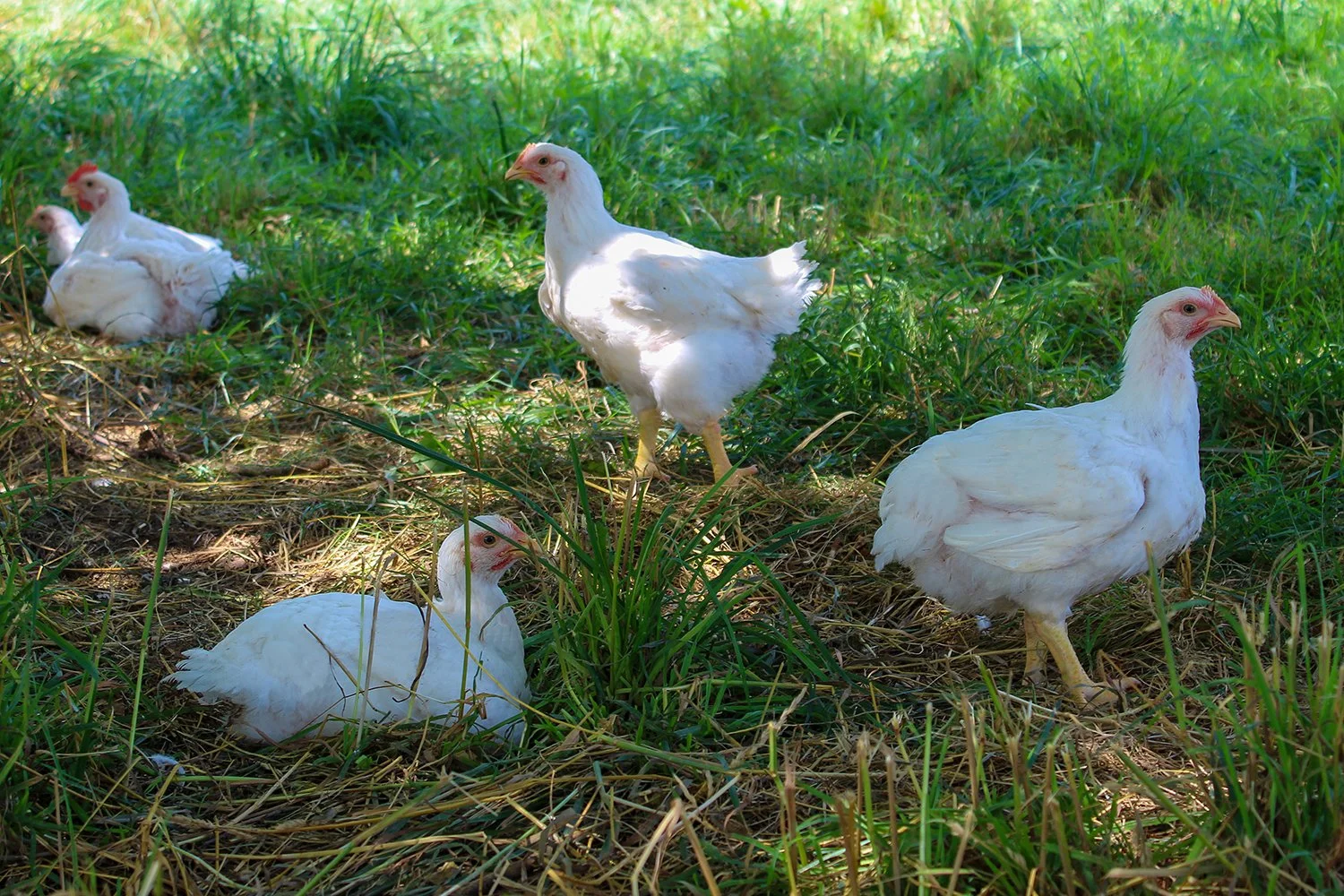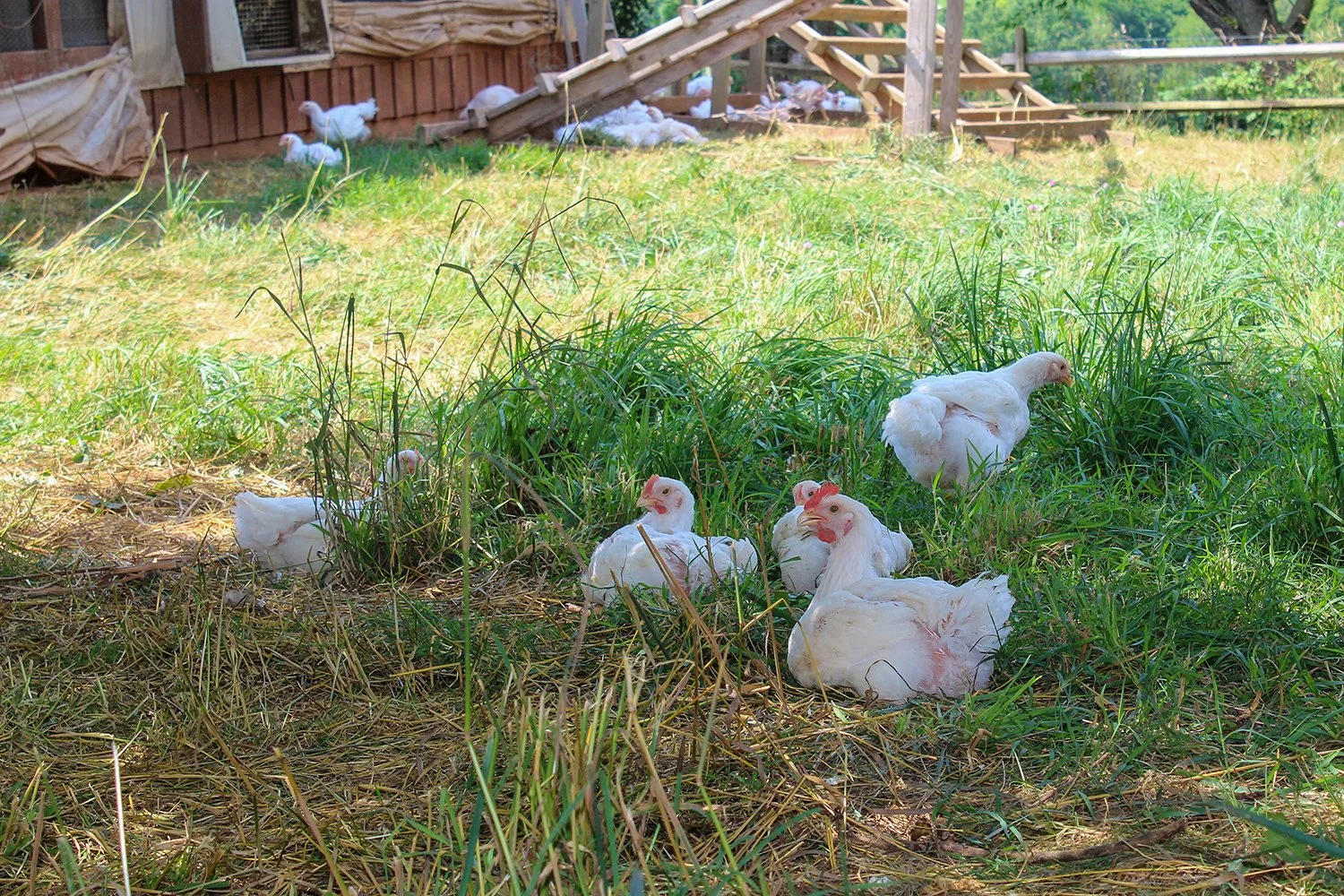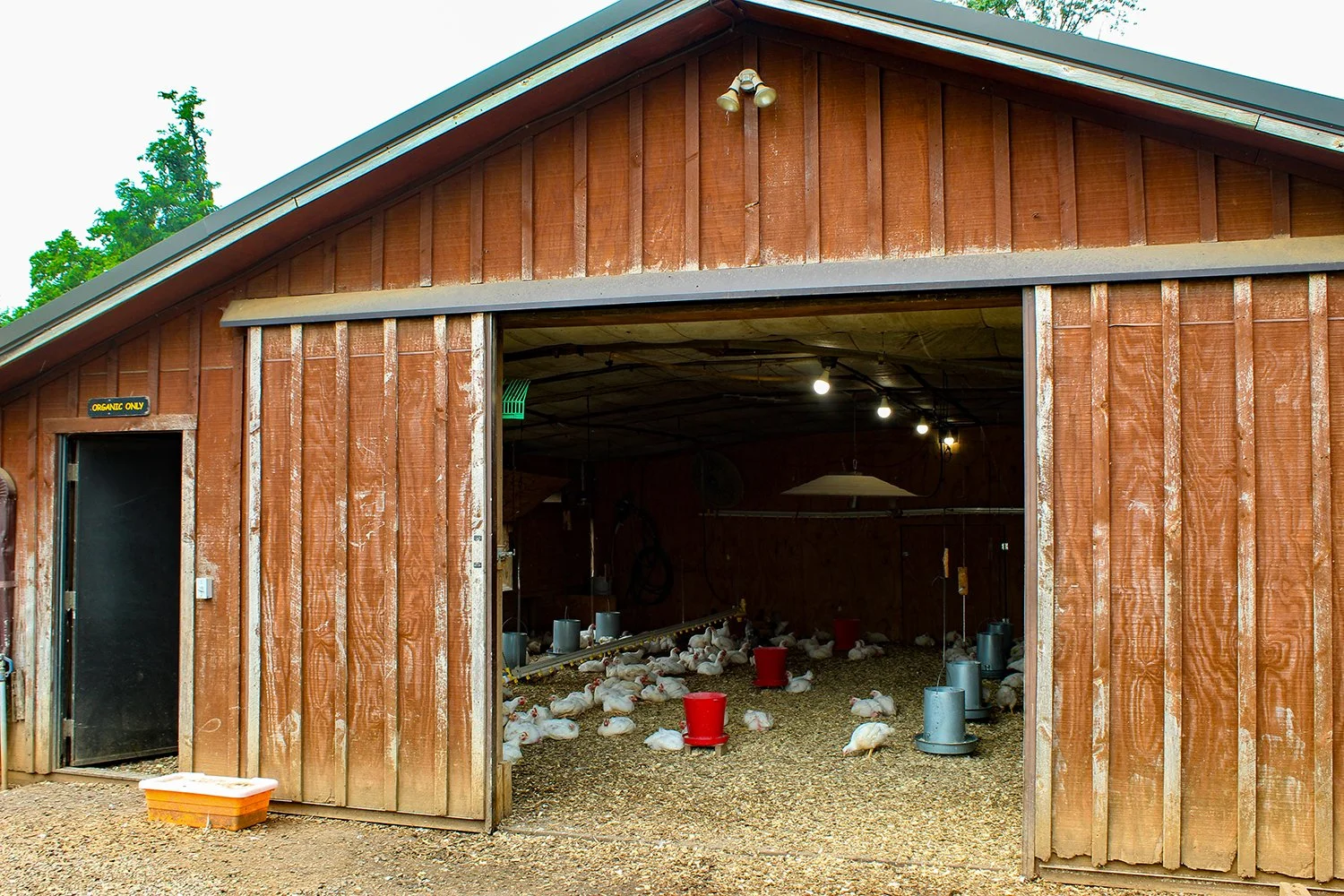Better chicken begins with a better life
A look inside Ayrshire Farm’s Certified Humane & Organic poultry program
Ayrshire Farm’s free-range chickens have unlimited access to both the indoors and outdoors for 12 hours per day.
This piece is part of the WholeHarvest Year series, which aims to chronicle the farming cycle at Ayrshire Farm.
Chicken: It’s a protein so ordinary we hardly give it a second thought. Cheap, easy to cook, delicious. Poultry is even pretty easy to raise too, in settings ranging from backyards to commercial facilities. But the humble chicken hides a complex story — one that prompts big questions about the life it leads before it reaches your plate.
So, what does it mean for a chicken to live a good life?
At Ayrshire Farm, the entire poultry program has been built around that question. The result is chicken that’s better for you, the animals, and the environment.
A Humane Approach
At large-scale commercial operations, a chicken’s existence is often short and cramped, with little to no access to fresh air or natural light. It’s a business model built on producing consistently sized birds for maximum efficiency and profit.
Smaller farms, on the other hand, have the freedom — and responsibility — to do things differently.
An outsider at first might not see much distinction between how Ayrshire Farm raises chickens versus another farmer down the road. But the difference, as with most things at Virginia’s first Certified Humane and USDA Certified Organic farm, comes down to the little things.
“Freshness and care. That’s what makes a difference,” says farm manager Chris Damewood. “The feed, the time outdoors, handling all the birds ourselves, processing right here on the farm. All those small things really do add up.”

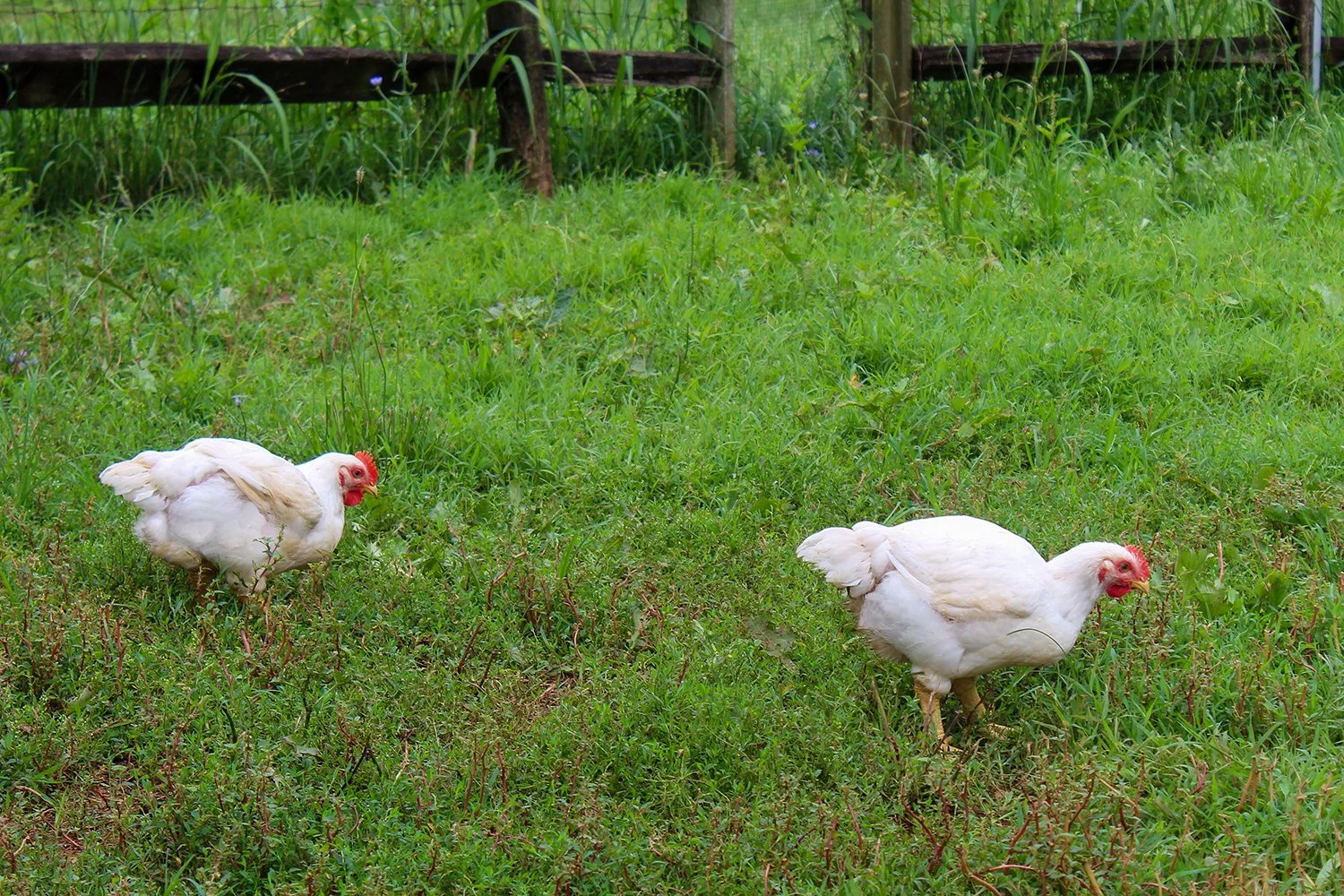
Broiler chickens peck for insects in their pasture at Ayrshire Farm.
Outdoor Access Makes All the Difference
The chicken yard on the southern corner of Ayrshire Farm is in a quiet but constant state of activity. Chickens are scattered throughout: pecking for insects, bathing in dust, or simply relaxing in the shade. Doing all the things a bird loves to do.
It might appear simple, but these seemingly ordinary activities are crucial to chickens’ health and well-being.
“Fresh water, good food, spending time outdoors – the same stuff that keeps humans healthy keeps animals healthy too,” Damewood says.
Once chickens are about two and a half weeks old, they graduate from the brooder and are turned loose on freshly rested pasture with the freedom to come and go from their broiler house as they please. Outdoor access is one of the biggest differentiators when it comes to Ayrshire Farm’s poultry.
“They’re outside 12 hours a day,” Damewood says. “We lock them inside at night to protect them from predators. Otherwise, we don’t limit their time outdoors unless there’s inclement weather. If the temperature is over 30 or 40 degrees, they’re outside.”
It turns out the benefits to letting chickens outside are numerous.
Outdoor access for broilers allows them to express natural behaviors that are restricted in intensive indoor systems, improving their overall health and welfare. Studies have shown that broilers with outdoor access have better leg health, reduced stress levels, increased activity levels, and may produce better-tasting meat.
“It keeps them more engaged, in an enriching environment,” Damewood says.
These free-ranging chickens get to enjoy a variety of plants and insects outdoors. Clover, grasses, earthworms, and other insects are not only great sources of nutrients, but hunting around for them is a stimulating activity that’s a reward on its own
Inside the broiler house, space to spread out is equally important. Chickens have ample room to enjoy shade, fresh food, and fresh water. Fans provide ventilation and, depending on the weather, windows are opened to increase wind flow.
Ayrshire Farm’s stocking density goes beyond the Certified Humane standard of 6 pounds per square foot, providing animals with even more space. While the maximum stocking density for broiler chickens in the U.S. is not regulated by law, most producers follow the National Chicken Council’s guidelines, which recommend densities up to 9 pounds per square foot.
The broiler house at Ayrshire Farm has plenty of space for chickens to enjoy fresh water, food, and shelter.
What Goes in Matters Most
A good life starts with good nutrition and hydration. At Ayrshire Farm, chickens are raised on a Certified Organic, non-GMO, and antibiotic-free feed. They are never given animal by-products, growth promotants, or any of the synthetic supplements common in conventional operations.
Clean, high-quality feed helps chickens grow at a steady, healthy pace, rather than the rapid weight gain caused by additives and artificial supplements used in conventional farming. It also produces better-tasting, more nutrient-dense meat.
Access to clean water is just as important. Ayrshire Farm uses linear waterers: long, narrow tubes suspended from the ceiling of a barn with evenly spaced nipples for the chickens to drink from. This design helps minimize the risk of contamination from dirt, feces, or bedding, which are common issues with open-style waterers.
Linear systems also allow for the delivery of cooler water, even during hot weather, which helps regulate body temperature and encourages hydration. For the birds, it’s a simple, safe, and consistent source of one of life’s most basic needs.
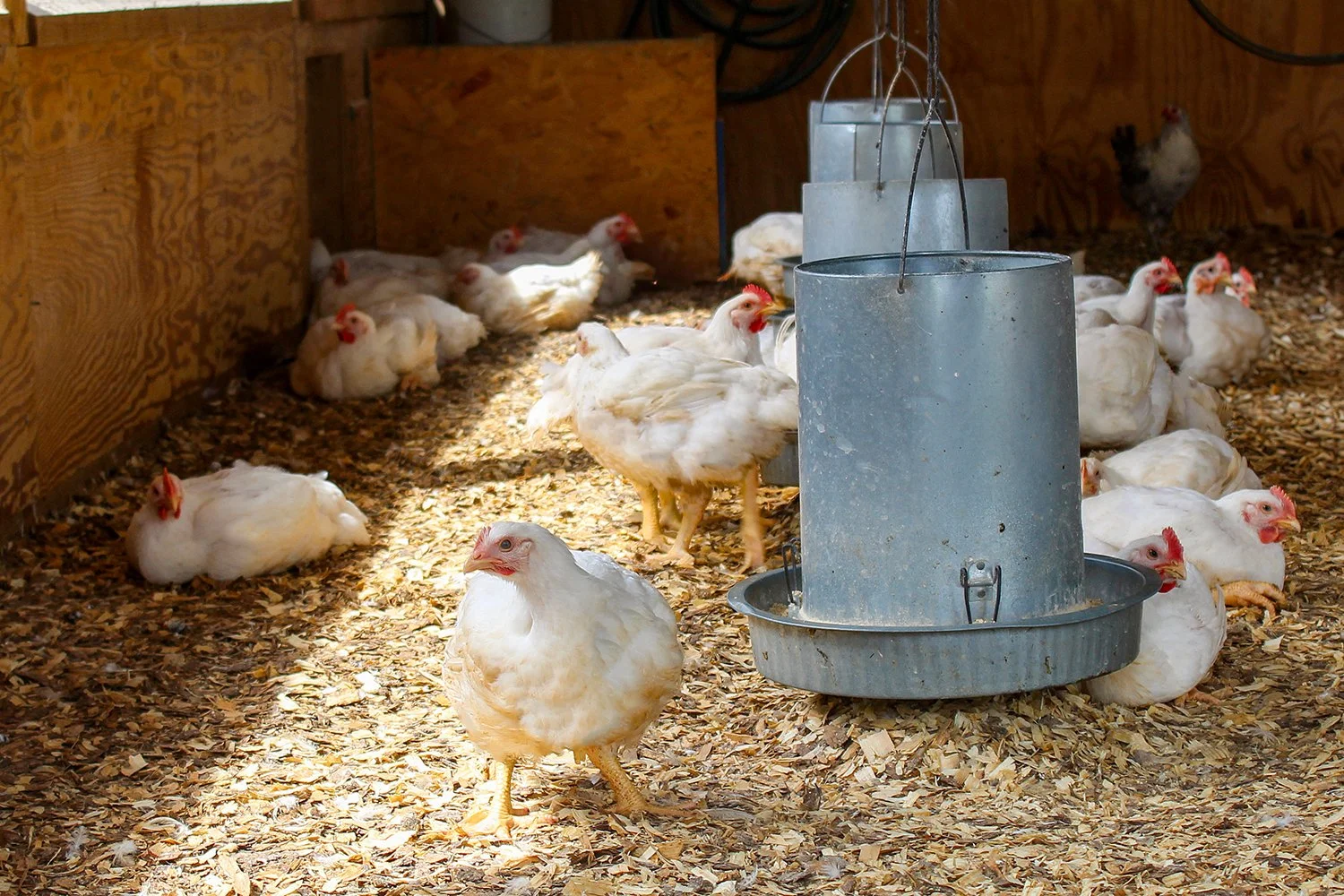
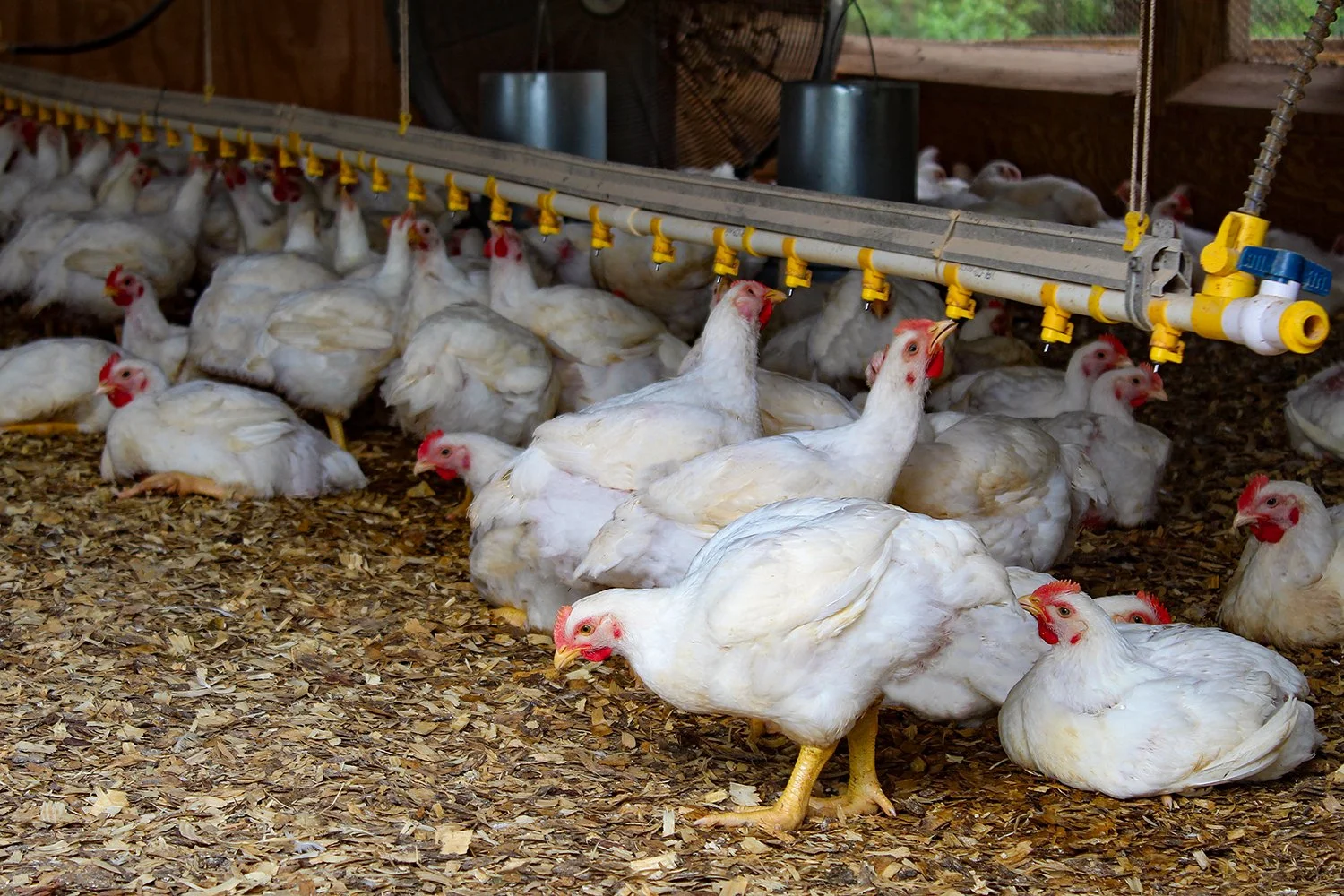
Ayrshire Farm uses Certified Organic, non-GMO, and antibiotic-free feed and linear waterers for its broiler chickens.
Cleanliness From Hatch to Harvest
You can smell the difference. Literally.
Many industrial chicken farms leave behind an unmistakable stench. But at Ayrshire Farm, you’d be hard-pressed to find a foul smell near the poultry yard.
It all starts with thorough cleaning before newborn chicks arrive at the farm. Blowtorches are used to disinfect floors and eliminate pests. Feeders and waters are sanitized to avoid contamination. Pastures are given at least 84 days of rest between chicken rotations.
Once everything is spic and span, the Cornish Cross chicks are picked up from Myers Poultry Farm in Pennsylvania within 24 hours of hatching. At their new home, the chicks immediately enter a brooder house where they’ll stay for the first two and half weeks of their life, protected from other animals, predators, and severe weather.
Inside the small enclosure, the youngsters are kept at a consistent temperature in the mid-90s, which sometimes involves using heat, opening windows or running fans, depending on the season. Baby chicks can’t regulate their own body temperature, and instead rely on external heat sources like a mother hen or, in domestic settings, heat lamps to stay warm and grow.
Because it’s so hot in the brooder house – and because little chicks can make a big mess – the farm’s crew checks ammonia levels from urine and feces at regular intervals and change out the bedding, food, and water daily. These same cleaning practices carry over to the broiler house as well for the remainder of their lives. Used bedding, feathers, and droppings are all composted at the farm, where they’ll later be used to replenish pastures and garden beds.
“Litter is something that’s not taken care of in conventional farms,” Damewood says, explaining, if you don’t stay on top of it, chickens can develop painful foot burns from sitting in waste. “We’re not letting that happen.”
Cornish Cross chicks arrive at Ayrshire Farm from a hatchery in Pennsylvania within 24 hours of being born.
A Respectful End to a Good Life
While access to a healthy, enriching, and clean environment is paramount to helping broilers thrive, at Ayrshire Farm their end-of-life experience is equally important.
On processing day, birds are gently hand-caught in pre-dawn hours to minimize stress, and each one is inspected before being taken to the farm’s own small USDA-inspected processing facility just a few yards away.
“That’s a huge difference,” Damewood says. “We’re literally processing 100 feet from their yard. We’re using our people, not outside crews. And actual hands are touching each individual bird.”
Most industrial producers use fast-paced, mechanical systems that prioritize speed over welfare. Birds are trucked long distances and processed by machines with minimal oversight.
Not so at Ayrshire. Every step is done with intention.
“We’re handling the birds, we’re packing them, we’re taking care of everything. These birds don’t have to travel hours,” Damewood says. “It’s a lot of little steps to help minimize discomfort, but they add up to something meaningful.”
Where to Find Ayrshire Farm Chicken
Ayrshire Farm’s poultry program isn’t just about doing what’s right, it’s also about producing delicious food that people can trust.
You’ll find Ayrshire Farm chicken featured in seasonal dishes at the farm’s own restaurant, Hunter’s Head Tavern, just down the road in Upperville. It’s also available for home cooks through WholeHarvest Poultry Boxes — a 15-pound assortment that includes a whole chicken, boneless breasts and thighs, bone-in dark meat, wings, and ground chicken or turkey.
Whether you’re dining out or cooking at home, you’re getting the same standard of care and quality that begins the day chicks arrive.
The Little Things Make a Big Difference
What makes better chicken? It’s not just the breed or the feed. It’s the sum of small, thoughtful choices made every day.
From brooder to pasture to processing, Ayrshire Farm’s approach proves that humane, sustainable poultry production isn’t just possible, it’s better for everyone.
When you choose chicken from farms like this, you’re supporting a food system rooted in respect: for animals, for the environment, and for the people who depend on both.
